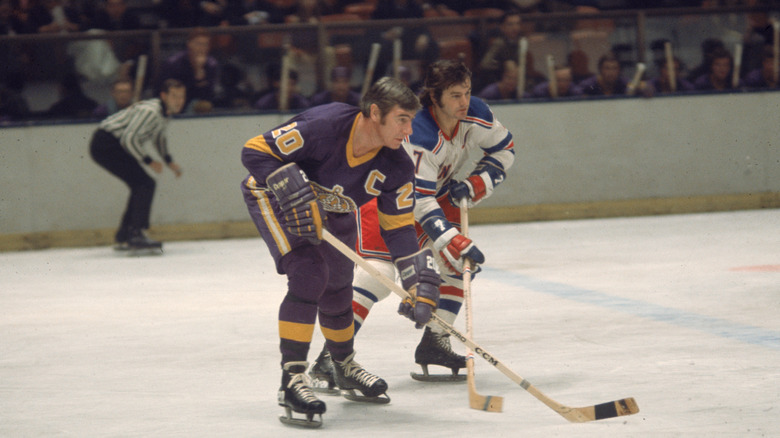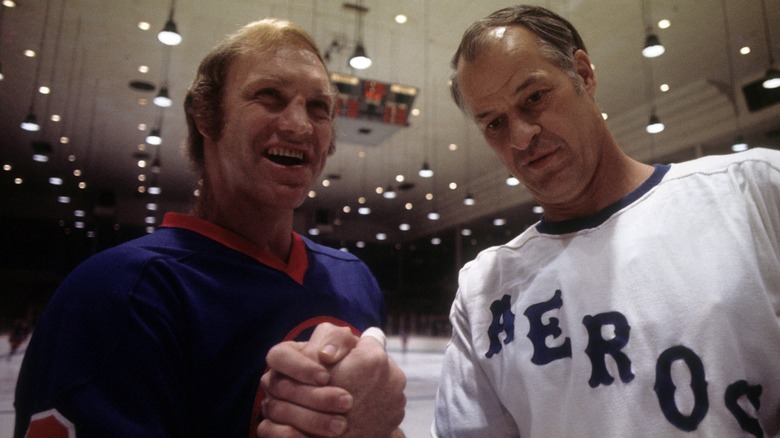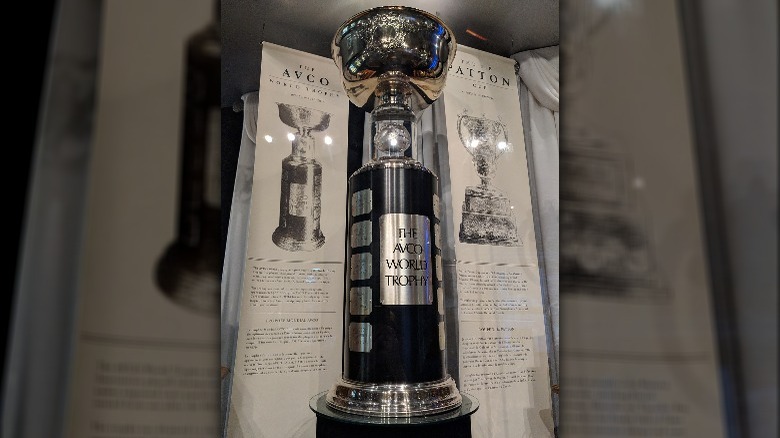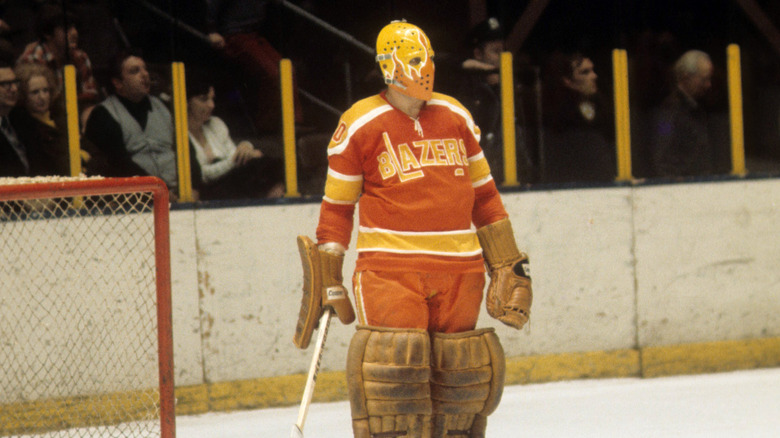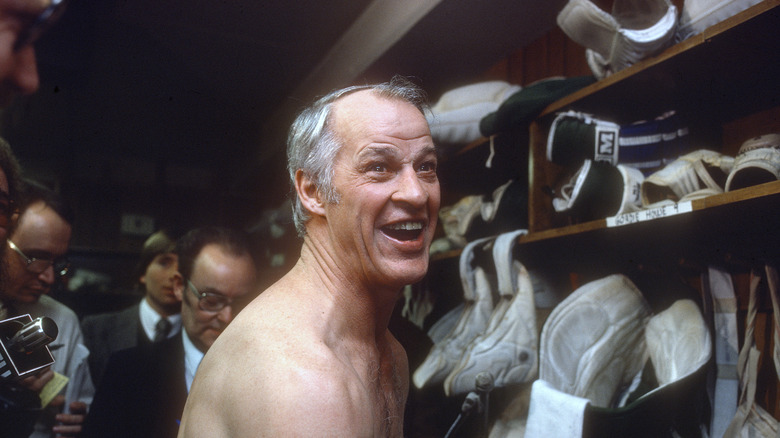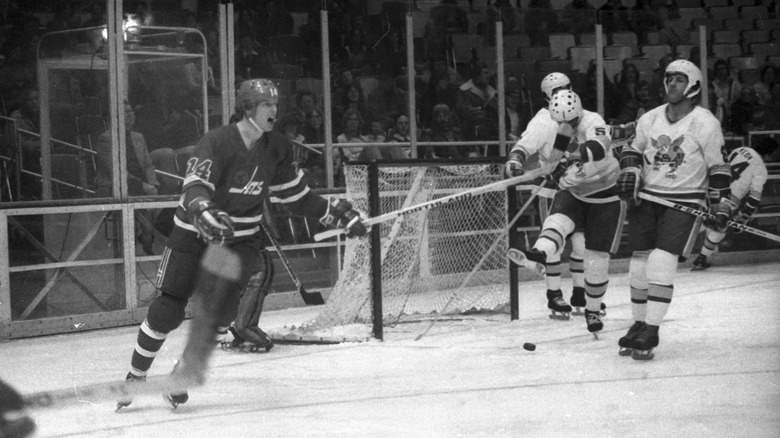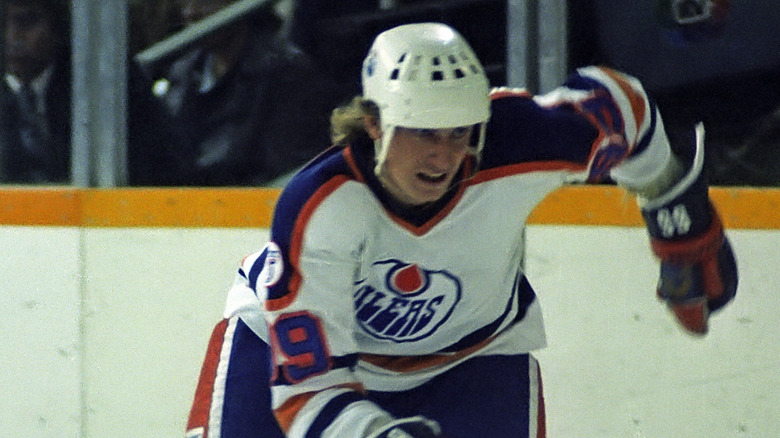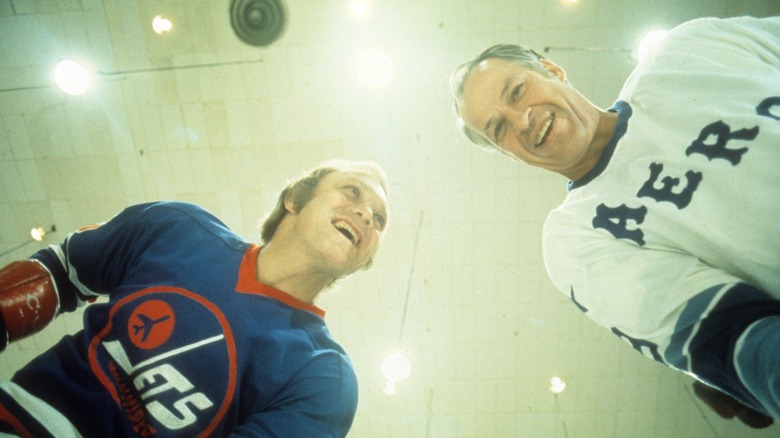How The World Hockey Association Tried To Dethrone The NHL In The 1970s
Very few upstart professional sports leagues can compete with a pre-established giant. There have been numerous attempts to compete with the NFL in the form of leagues like the original USFL and XFL, which tried to bring something to the table — whether it was by bringing pro football to new markets or adding new gimmicks to the sport — but couldn't compete with the reach and brand recognition of the NFL.
One league that managed to at least make their established competition's top brass break out in a bit of a sweat was the World Hockey Association, which served as an alternative to the National Hockey League through most of the 1970s. The WHA managed to do what few other upstarts have accomplished by poaching some of the sport's biggest names and newest upcoming talent away from the NHL and offering huge amounts of money in the process. While it lasted less than a decade, some of the remnants of the WHA are still around today (via The Hockey Writers).
The NHL was hesitant to expand
The Detroit Red Wings, Chicago Blackhawks, New York Rangers, Boston Bruins, Montreal Canadians, and Toronto Maple Leafs make up the National Hockey League's Original Six. It's a bit of a misnomer, in that they weren't the league's first six franchises, but they were the six that managed to remain in the league while others, like the Montreal Wanderers, Toronto Arenas, and the original incarnation of the Ottawa Senators, had to close up shop (via The Hockey Writers). From the early 1940s to the late 1960s, these were the NHL's only franchises. According to Pro Stock Hockey, in 1967, the league doubled with the addition of the Philadelphia Flyers, Pittsburgh Penguins, Los Angeles Kings, St. Louis Blues, Minnesota North Stars, and California Seals.
The NHL was growing, but at a snail's pace. The next round of expansion came in 1970, with the Buffalo Sabres and Vancouver Canucks entering the league, followed in 1972 by the New York Islanders, and the league's first foray into the American south with the Atlanta Flames. There were still a lot of markets out there that seemed like fertile ground for professional hockey, and the WHA's founders — an attorney from California named Gary Davidson and promoter Dennis Murphy, per Hockey Central — hoped to exploit that.
Big names in small markets
The WHA's inaugural season was in 1972 with teams in a mix of small markets where their team would be the unquestioned top dog, but also teams in markets already occupied by NHL Franchises. The latter included teams like the Los Angeles Sharks and the New York Raiders, while teams like the Alberta Oilers and Quebec Nordiques served markets that were hungry for hockey, but didn't have an NHL presence (via The Hockey Writers). The league gave many of their franchises names that played off local pride or history to help ingratiate them to fans — examples of this included the New England Whalers and the Houston Aeros.
Simply putting teams in new markets wouldn't be enough for sustained success, and the WHA knew that. They needed to make a splash and they did so by signing big-name players away from the NHL. For their first season, the WHA managed to court 67 players away from the NHL, including Boston Bruins goaltender Gerry Cheevers and two-time Stanley Cup champion netminder Bernie Parent from the Philadelphia Flyers. However, the league's biggest signing in its early days was Bobby Hull (above, left, with Gordie Howe). The Golden Jet signed a mammoth 10-year, $2.75 million deal with the Winnipeg Jets, and became the league's first marquee player.
The WHA's first season
Despite some hiccups here and there, the WHA's first season was a success. So much so, in fact, that the league successfully pulled off an all-star game in Quebec City, and had a game broadcast on CBS, giving the league national television exposure in the United States (via Hockey Central).
That season the New England Whalers and the Bobby hull-led Winnipeg Jets claimed the top spots in the Eastern and Western Divisions, respectively. The two teams met in the finals to play for the AVCO World Trophy — which was eventually renamed the Avco Cup — the league's version of the Stanley Cup, which was given to the WHA by AVCO Financial Services Corporation as part of a sponsorship deal.
The Whalers put on a show to claim their only championship, dispatching the Jets in only five games. With that, World Hockey Association had officially survived its inaugural season, but signs of trouble were just around the corner.
Instability strikes the WHA
One of the biggest problems the World Hockey Association faced throughout its entire run was the inability to keep its franchise lineup consistent. Whether it was just a name change or a complete relocation, the WHA was different from year to year.
According to Hockey Central, after just one season, teams were moving and rebranding. The Philadelphia Blazers made a trans-continental move to British Columbia and became the Vancouver Blazers. They eventually moved to Calgary and became the Calgary Cowboys. The Ottawa Nationals stayed in Ontario, but moved south to Toronto and became the Toronto Toros, before finishing out their WHA run in Alabama as the Birmingham Bulls. The New York Raiders changed their name to the New York Golden Blades, but they made a mid-season move across the Hudson River during the '73-'74 season and became the New Jersey Knights, which was followed by an off-season move to San Diego for the '74-'75 season and a name change to the San Diego Mariners.
Those were just a few of the many franchises that moved, while others folded, and more joined the league. It's tough for fans to keep up and develop a connection with a team if the athletes are constantly on the move.
Mr. Hockey arrives in the WHA
Despite the obvious franchise instability, the WHA once again employed one of its favorite tactics and signed a high-profile name, and this one was a doozy. Ahead of the 1973-74 season, it was announced that the Houston Aeros had signed none other than Mr. Hockey himself, Gordie Howe. However, it didn't stop there, as the team had already drafted his two sons, Mark and Marty. According to The Hockey Writers, Howe wrote in his 2014 autobiography ("Mr. Hockey: My Story") that upon his and his son's arrival in Houston, they were met with a banner that rechristened the city "Howeston."
Howe had been retired from the NHL for two seasons and held the league records for most games played, goals, assists, and points. His return made a huge impact on the team's fortunes. The Howes laced them up for the Aeros from 1973-'74 to 1976-'77 over which time they posted a monstrous 204-101-11 record and won a pair of AVCO Cups. Financial issues for the Aeros led to the Howes leaving for New England and joining the Whalers.
The WHA gave international players a shot
The WHA is well-remembered for its habit of sticking big contracts under the noses of start players, but they did something else that put them ahead of the curve. The league took the "World" in World Hockey Association to heart, and according to Hockey Central, they managed to organize a series of exhibition games in the Soviet Union featuring the Soviet National team against a team of WHA All-Stars. The Soviets won all eight of those games.
The league also welcomed more players from Europe than the NHL did at the time. Up to that point, North American professional hockey teams were overwhelmingly North American. However, in Europe, there was a wealth of untapped talent. According to The Hockey Writers, this was partially done out of necessity because the North American talent pool had been diluted by having two major leagues vying for the best players. Players from European countries brought a new dynamic to the game that utilized speed and finesse which they developed playing on Europe's slightly wider rinks. This differed from the way the game was trending in North America, where teams utilized brute strength and aggression, like the Boston Bruins and, most famously, The Broad Street Bullies era Philadelphia Flyers. The Winnipeg Jets used a lineup with a bunch of players from Sweden and Finland to great effect by putting Bobby Hull on a line with Swedes Ulf Nilsson and Anders Hedberg, which turned out to be a combination that packed an offensive punch.
The WHA gave some young, future Hall of Famers their first shot
With financial difficulties looming large for the WHA, the clock was winding down. Franchises folded like cheap lawn chairs, and others moved to try to wring out every last bit of cash they could before they also went defunct. According to The Hockey Writers, the beginning of the end for the WHA is remembered for being the start of some legendary careers.
The goal for most players was still to make it to the NHL, and for the most talented young players, the WHA became an attractive alternative to toiling away in the minor leagues. This was a bad sign for the league, as it was yet another indicator that its hopes of being a competitor with the NHL were diminishing more and more.
Mark Messier went on to be a member of the Edmonton Oilers dynasty of the 1980s and also captained the New York Rangers to a 1994 Stanley Cup victory, which ended a decades-long drought. He started his professional career by splitting the 1978-'79 season — the WHA's last — between the Indianapolis Racers and Cincinnati Stingers (via HockeyDb). That same season, The Great One himself, Wayne Gretsky, made his professional debut with Indianapolis, but with the team facing financial difficulties and the impending ceasing of operations altogether he was shipped off to the Edmonton Oilers.
The WHA dissolves
According to The Hockey Writers, the World Hockey League officially came to an end in June 1979, but signs of the league are still around today. Four of the league's teams — the Edmonton Oilers, Hartford Whalers, Winnipeg Jets, and Quebec Nordiques — all made the jump to the National Hockey League. All four franchises still exist, but three of them play under different names and in different locations. The Whalers eventually became the Carolina Hurricanes, the Nordiques became the Colorado Avalanche, and the Jets moved to the desert and became the Phoenix Coyotes. The modern Winnipeg Jets only share a name with their WHA counterpart, so the Edmonton Oilers are the only team still playing in the same city and with the same name they had during their WHA days.
The WHA had another effect on the NHL. Some of its rules and policies, most notably allowing players under 20 years old, were considered progressive for their time, and the NHL went on to adopt them. The NHL also took notice of WHA's way of paying players, which led to players earning higher salaries than they had previously. While it failed to stick around for even 10 years, the World Hockey Association left behind an indelible mark on not just the National Hockey League, but the sport of hockey as a whole.

